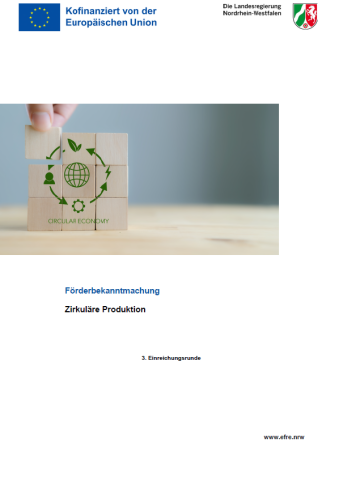Circular production
Reusing or reusing instead of throwing away - that is the approach of the circular economy. With the "Circular Production" funding call, North Rhine-Westphalia is promoting the development of products and processes that advance the circular use of resources in industry.
The holistic circular economy ("circular value creation") is becoming increasingly important in industrial production. It promises products that are low in pollutants, durable, repairable and recyclable at the end of their useful life. The aim of the "Circular Production" funding call is to drive forward the experimental development of cycle-oriented prototypes. These are to be used for machines, products and processes in the field of industrial production. A circular economy offers considerable future growth potential and also ensures that the strategic dependencies of the state of North Rhine-Westphalia and the European Union are reduced.
Extending the service life of products and processes
The call particularly promotes projects that use circular product design, reduce the material consumption of industrial processes, increase the sustainability of materials, improve modularity and up-grade capabilities or are aimed at extending the service life of products.
Projects for the development of critical technologies in the following areas are eligible for funding:
- digital technology and technology-intensive innovations such as advanced semiconductor technologies, artificial intelligence (AI), quantum technologies, advanced sensor technologies, robotics and autonomous systems
- environmentally friendly and resource-efficient technologies such as solar technologies, on-shore wind power technologies and offshore renewable energy, battery and energy storage technologies, heat pumps and technologies for geothermal energy and hydrogen technologies
- biotechnologies such as DNA/RNA, proteins and other molecules, cell and tissue culture and engineering, biotechnology process engineering, gene and RNA vectors, bioinformatics or nanobiotechnology

Förderbekanntmachung „Zirkuläre Produktion", 3. Runde
Frequently asked questions
Small and medium-sized enterprises (SMEs) based or with a branch in North Rhine-Westphalia
.Applications can be submitted until March 31, 2025.
The "Circular Production" call provides for a one-stage selection procedure. Applications are submitted online via the EFRE.NRW.online portal. Please take advantage of the advice offered by the NRW Innovation Promotion Agency in advance.
Find your contact person
Dr. Sebastian Dziallach
Innovationsförderagentur.NRW
Wilhelm-Johnen-Straße
52428 Jülich
Deutschland
Alexander Gußfeld
Innovationsförderagentur.NRW
Wilhelm-Johnen-Straße
52428 Jülich
Deutschland
Ergebnisse
CircLocTags
Wo landet der ausgediente Sneaker? Mit einem RFID-Tag können alte Kleidungsstücke innerhalb von Sekunden gefunden, gesammelt und anschließend sortiert und wiederverwertet werden. Im Projekt „CircLocTags“ wird neben technischen Fragen auch untersucht, wie solche RFID-Tags selbst möglichst nachhaltig und umweltfreundlich konzipiert werden können.
Der MegaBag
Zement, Asche, Kalk, Mehl: all diese und weitere Rohstoffe werden bislang in Silos oder Einweg-Plastiksäcken zu ihrem Einsatzort gebracht. Es muss also entweder die nötige Infrastruktur zum Be- und Entladen vorgehalten werden oder es fallen große Mengen Verpackungsmüll an. Hier setzt das Projekt „MegaBag“ an: Entwickelt wird ein langlebiger Mehrwegbehälter mit einem zusammenlegbaren Exoskelett und einer flexiblen Ummantelung sowie ein dazu passendes Mehrwegsystem.
Greenstructure
Raumfahrt, aber nachhaltig: Im Projekt „GreenStructure“ werden Nanosatelliten bzw. Bauteile dafür nicht, wie bisher üblich, aus Aluminium gefräst, sondern mittels Spritzgussverfahren aus Kunststoffen hergestellt. Das spart Material, Gewicht und Zeit in der Herstellung. Im Projekt sollen Prototypen für ein Baukastensystem aus modular zusammensteckbaren Kunststoffbauteilen entwickelt werden.
Runderneuerung EM-Reifen
Die Herstellung von neuen Reifen – insbesondere für Nutzfahrzeuge wie Bagger – ist teuer und ressourcenaufwändig. Daher wird bereits heute das tragende Gerüst alter Reifen, die Karkasse, wiederverwendet und neue Profile aufgebracht. Im Projekt „Runderneuerung EM-Reifen“ werden Robotik-Prototypen entwickelt, um diese körperlich anstrengende Arbeit intelligent und effizienter zu gestalten.
ZirkuBat
Aus gebrauchten Batterien wieder heue herstellen: Das Projekt „ZirkuBat“ zielt darauf ab, ein innovatives und nahezu emissionsfreies Recyclingverfahren für Batteriematerialien mit einem flammen-basierten Syntheseverfahren zu etablieren. So kann eine ressourcenschonende und wirtschaftlich rentable Rückgewinnung von Stoffen wie Lithium, Nickel, Kobalt und Mangan aus gebrauchten Batterien realisiert werden
ZiProTex
Polyester-Textilien zurück in ihre Bestandteile zu zerlegen, um sie nachhaltig verwerten zu können: Daran wird im Projekt „ZiProTex“ gearbeitet. Dabei wird im Gegensatz zu herkömmlichen Verfahren eine elektrochemische Kristallisation genutzt, um Monomere ohne salzhaltige Abfälle zurückzugewinnen. Damit trägt das Projekt zu einer Kreislaufwirtschaft für Textilien bei.
Alle Fördermaßnahmen ansehen
Das EFRE/JTF-Programm NRW 2021–2027 fördert Projekte aus den Themenfeldern Innovation und Forschung, Gründung und Digitalisierung, Klimaschutz und Klimaanpassung, Stadt und Region, Transformation in Kohleregionen sowie Strategische Technologien. Finden Sie jetzt die passende Fördermaßnahme für Ihr Projekt!